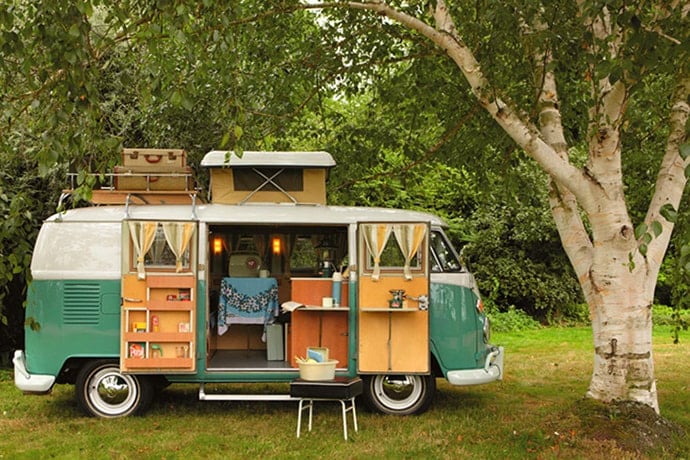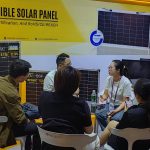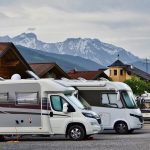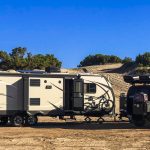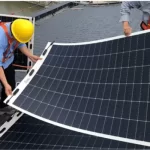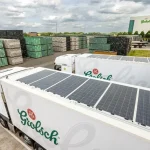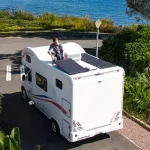Table of Contents
- Professional use of campervans: examples
- Advantages of solar panels for campers
- Disadvantages of solar panels for RV
- How much does a solar panel system for a campervan cost?
- How many watts does a campervan need?
- Which solar panels are right for RV?
- How long do solar panels on RVs last?
- How to install solar panels on campervans?
- Is there an RV solar panel kit available for campers?
- What are the best solar panels on the market for campers?
How to save on solar panels for campers: uses, benefits, installation tips, and best photovoltaic panel options from.
To save on energy costs, installing a system with solar panels on a campervan is a quick and practical solution for being independent of the grid while traveling or parked outside of an organized area, without having to be connected to an electrical outlet.
In this article, let’s look at the advantages of solar panels for campervans as well as the costs of installation and maintenance, how to choose the right panels and power supply for your campervan, with or without a storage system (batteries), and compare market offers.
Professional use of campervans: examples
There are many companies and professionals who use campervans to carry out their work or provide services to their clients. For example, they can be used to create mobile offices that provide a comfortable and functional workspace wherever the client is.
Examples of traveling professionals who use campers to work in different locations are photographers, videographers, and musicians. These campers often customize their equipment to suit their work, such as photography equipment, recording equipment, or musical instruments.
Campervans are also used to create mobile laboratories for testing, analyzing, and technical work in the field, as well as: mobile showrooms for demonstrating products or services to customers in different locations and environments; mobile medical units to provide medical care in remote or hard-to-reach locations; and logistical support units to provide temporary shelter, kitchens, bathrooms, and accommodations for support personnel at construction or event sites.
In addition, campervans are often used by transportation companies as vehicles for transporting goods and materials. This type of RV is often modified to accommodate racks and shelves so you can carry different-sized items. Catering companies turn RVs into mobile kitchens to serve food in places where no kitchen or restaurant exists.
Marketing companies often use RVs as a travel marketing tool to promote products and services and customize them with company logos and colors. Campers organized in this way can also be used to travel from one show to another or to visit different cities. The companies that organize the events let the campers customize them for specific activities and may equip them with audio and video equipment.
In short, the possible uses of campers by companies and professionals are almost limitless, and in all cases, the installation of photovoltaic panels brings unquestionable benefits.
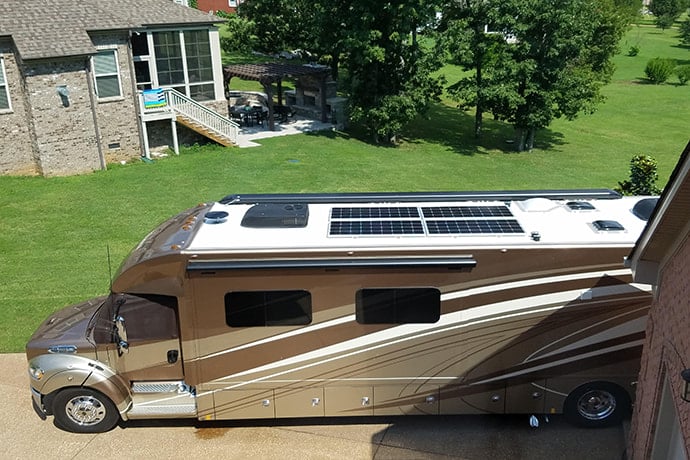
Advantages of solar panels for campers
In conclusion, the use of solar panels for campers offers a variety of advantages, including savings on energy costs, ecological solutions, freedom of movement, and energy autonomy. Here are the main reasons why campers choose solar panels:
- Savings: Solar panels generate free and clean energy, eliminating the need for generator costs or power outlets on the ground;
- Sustainability: It is a more ecological solution than traditional gasoline generators;
- Freedom of movement: With the energy generated by the solar panels, it is possible to move around with the campervan even in remote areas without having to connect to a ground power supply;
- Simple installation for those less familiar with it: it can be carried out even without the intervention of a technician;
- Energy autonomy: Once the panels have been installed, the campervan is autonomous and has virtually unlimited access;
- The panels are durable for 20-25 years, ensuring a return on investment with minimal maintenance.
Disadvantages of solar panels for RV
Before deciding whether installing photovoltaic panels on a campervan is the right solution for your needs, it is important to also consider the disadvantages of this option. Here are some of the disadvantages of solar panels for RVs to consider:
- Initial cost: Despite the fact that their price has decreased in recent years, solar panels for campers still come with a considerable cost;
- Reduced performance in adverse weather conditions: In the presence of snow, rain, or heavy clouds, solar panels may produce less energy or even stop working altogether;
- Energy production limitations: The amount of energy produced by photovoltaic panels depends on the size and number of panels installed and may not be sufficient to meet all of a camper’s energy needs, especially in cases of intensive or prolonged use;
- Size: Caravan solar panels require space for installation, which can be problematic for smaller vehicles;
- Weight: Photovoltaic panels add weight to the vehicle, which can reduce the fuel efficiency and maneuverability of the camper;
- Maintenance: Panels require regular cleaning and may need occasional servicing due to exposure to the elements;
- Difficulty of repairs: If you have any problems with your solar panels, you may need to replace them completely, which can be both expensive and time-consuming;
- Visual impact: Photovoltaic panels on the roof of a campervan can change the aesthetics of a vehicle, but not all owners will appreciate this.
How much does a solar panel system for a campervan cost?
The cost of an RV solar panel system depends on several factors, including the size of the system, the brand of photovoltaic panels, the quality of the materials, the capacity of the batteries, the type of charge controller, and the installation. On average, the cost of an RV solar system ranges from a few hundred dollars for a basic system to thousands of dollars for larger, more complex systems.
For example, a basic system with 100 watt solar panels, a charge controller, 100 Ah batteries, and an inverter will cost around $500-$800, while a larger system with more solar panels, larger batteries, and a more powerful inverter may cost €2,000-$4,000 or more.
However, it is important to remember that installing a solar system can provide significant long-term cost savings by reducing dependence on traditional energy sources and ensuring a return on investment within a few years.
How many watts does a campervan need?
The amount of solar energy required to make a caravan energy-independent depends on the needs of the equipment installed in the caravan. However, a rough estimate can be made by considering the average energy requirements of a motorhome.
In general, RVs need about 200-400 watts of solar energy to be partially independent, i.e., to power low-power electronic devices, such as telephones, computers, lighting, and basic household appliances.
If you need a more advanced system or want to become fully independent and supply energy for intensive and prolonged use, such as with appliances that consume a lot of energy, such as heating and cooling systems, refrigerators, ovens, microwaves, etc., you may need a larger solar system with a capacity of 500-1000 watts or more.
It’s worth noting that installing a custom solar system requires an accurate assessment of the camper’s energy needs and usage conditions, including the devices you need to power and the amount of available sunlight in your area
Which solar panels are right for RV?
Again, in this case, choosing the type and size of solar panel that is best for your camper depends on your specific energy needs. Generally, for medium-sized and purpose-built motorhomes, use solar panels with between 100 and 300 watts of power.
When choosing solar panels to install on camper, it is important to consider compatibility with your camper’s battery charging system. Typically, RV solar panels come with charge controllers to control battery charging and prevent overcharging.
You will then need to evaluate which of the different types of solar panels available for campers will best suit your needs. Each type of solar panel has its pros and cons, and the choice depends on the camper’s energy needs, budget, and personal preferences. In any case, it is crucial to evaluate the quality of the materials and construction of the solar panels as this will affect their durability and reliability.
Keeping in mind that before purchasing or installing a solar system, it is always advisable to consult an expert in the field to assess your needs and the available options, we have listed below the main types of solar panels that can be installed on a campervan:
- Monocrystalline panels: the most efficient and expensive type of solar panel, capable of converting more solar energy into electricity. They consist of monocrystalline silicon and are able to produce more power than polycrystalline or amorphous panels;
- Polycrystalline panels: they are cheaper than monocrystalline panels, but also less efficient. They consist of multiple silicon crystals and are dark blue in color;
- Amorphous panels: These panels are also cheap but at the expense of efficiency. They have the advantage of being made of a thin layer of photovoltaic material, which makes them flexible, lightweight, and suitable for installation on curved or irregular surfaces;
- Semi-flexible panels: These are monocrystalline or polycrystalline solar panels with semi-rigid supports, which makes them suitable for mounting on curved or irregular surfaces.
How long do solar panels on RVs last?
As a rule, photovoltaic panels on campervans are very durable, with an average lifespan of 25-30 years, even if this depends on the conditions of use, the maintenance performed, the quality, and the type of model.
With regard to the lifespan of solar panels, it should be emphasized that an average lifespan of 25 years does not mean that the panels will stop working after that. In general, during the life cycle of a photovoltaic panel, the ability to generate energy gradually decreases due to wear and tear of the material or damage caused by external factors. This is why it is important to pay attention to regular maintenance of the panels and any necessary repairs to ensure optimal functionality and extend their lifespan.
How to install solar panels on campervans?
Installing solar panels on campervans can vary, depending on the characteristics of the vehicle and the type of solar panel. This is usually accomplished by performing the following steps:
- Select the location and orientation of the solar panel, ensuring that the area is exposed to sunlight for most of the day and that there are no obstructions that could cast shadows on the panel, such as those created by an antenna or ventilation grille;
- Secure the panel brackets to the top of the camper using the appropriate screws and bolts. The brackets and holders can be secured directly to the top of the camper or to a separate structure as required;
- Connecting the panel charge regulator to the battery to optimize solar power generation, ensuring that the regulator is located within reach and protected from inclement weather;
- Connecting the solar panels to the charge controller using special cables provided by the manufacturer to avoid overheating problems or damage to the components. It is also important to ensure that the cables are securely connected and protected from sunlight and inclement weather during this step;
- Install an inverter to convert the energy generated by the solar panels from direct current (DC) to alternating current (AC);
If you need to use household appliances or devices that require AC power, use a voltmeter to check the voltage output from the solar panels and verify that the system is working properly.
In all steps, it is important to consult the installation manual and follow the manufacturer’s instructions, and it may be necessary to seek the advice or assistance of a qualified professional to install the solar panels on the camper.
Is there an RV solar panel kit available for campers?
Yes, there are a number of photovoltaic kits on the market that make it easier to install a solar system on a motorhome. These kits include all the components needed to install PV on a campervan, such as solar panels, charge controllers, cables, connectors, and installation instructions.
Camper RV solar panel kit is designed to meet the specific energy needs of campers and is available in a variety of sizes and wattages. For example, some RV solar kits can provide enough power for your lights and basic electronics, while other kits can provide enough power to power your refrigerator, microwave, and other appliances.
It is important to choose the right RV solar panel kit for your specific needs and the size of your camper. Additionally, it is important to ensure that the kit contains high-quality components and that they are compatible with your vehicle’s electrical system.
What are the best solar panels on the market for campers?
There are many makes and models of RV solar panels on the market. Choosing the best solar panels depends on the characteristics of your vehicle as well as your needs and preferences for the power needed for your vehicle’s appliances and equipment, battery capacity, efficiency of the panels, and warranty. Obviously, it is also important to consider the available budget. Here are some of the best solar panel brands for campers along with their models and key features.
Renogy
Renogy offers a wide range of solar panels, charge controllers, and mounting kits for RVs of all sizes. Their products are known for their efficiency and reliability. Their most famous models include:
100W Collapsible Solar Panel: This panel is lightweight, portable, easy to use, and has a high conversion rate of solar energy into electricity;
200W monocrystalline solar panel: This panel is equipped with high-quality monocrystalline solar cells that enable it to convert solar energy into electricity very efficiently. High-performance and reliable solar panels that convert solar energy into electricity with high efficiency, are very resistant to harsh weather, and are easy to install.
Sungold Solar
Sungold is another popular brand among campers, offering high-quality and innovative products. Among its most famous models, we find portable solar panels for campers – the Hi-Power series as well as flexible solar panel kits TF series. The Hi-Power series has a high power output and can be compatible with portable power stations, while the TF series of flexible solar panels are compact, lightweight, and have a power range of 50W-290W. The portable solar panels are waterproof and have a built-in USB port for charging mobile devices.
Sunforce
Sunforce is known for producing solar products for home and commercial use but also offers solar panels for RVs. Their products are known for their durability and ruggedness.
For example, the Sunforce 50022 5 Watt Solar Battery Trickle Charger, a portable solar panel for charging a campervan’s batteries, has a flexible mounting system and a 10-year warranty. Prices are slightly less than €50.
Go Power
Go Power! is a Canadian company specializing in RV and camper products. Offering a full line of solar panels, batteries, inverters, and charge controllers. Their products offer good efficiency and reliability with models ranging from 10 to 570 watts.
One of their most popular models is the Go Power! GP-PSK-120 120W Portable Folding Solar Kit, which is foldable, lightweight, and portable. The price is around 600 euros.
Article courtesy of Sungold
To learn more about solar panels. Click on https://www.sungoldsolar.com/


